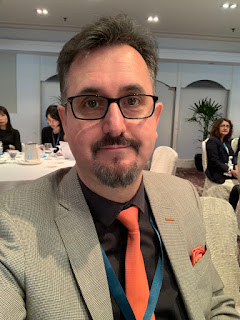Half an Hour,
Oct 24, 2019
Summary of talk by Martin Dougiamas at e_learning Africa.
I'm just going to focus on open ed-tech. We had a conference about Moodle in this room yesterday.
Our mission at Moodle is to improve the world, and we're doing this by making an open source platform. The values drive the project. The way to have thousands of people contribute, the values are needed. Education, openness, integrity, respect and innovation are these values.
Around the world around 60% of higher education is using Moodle to connect teachers and classes. In Africa it's about 90%. This is a piece of infrastructure we are all relying on. But I don't want to talk about Moodle, I want to talk about open technology, because it works.
Open EdTech. What do I mean by these?
Open is often contrasted with proprietary. But I want to present an alternative view. There's the Silicon Valley way of making software, but there are many other ways to build software. This brings up the concept of Ubuntu, a really good African word for the spirit that makes openness work. It's about family, it's about community, it's about sharing, you don't have any barriers. This is the essence of being human; we are all connected, we are all working for the common good.
You have to look at the world in terms of physics. This clicker costs money to make. We have a commerce model around moving atoms and making things. But in the digital world, that sort of model is no longer needed. You only need to pay for making one copy (and the people who make this should be paid, open source should be paid).
What the cost is in the online world is attention. Attention is the currency. It's not about atoms any more, it's about attention. But we are not focusing on the right things. We're focusing on making money and commercial things, and now we have huge problems to solve.
What happens in the commercial system is there is energy loss. What happens is investors take from the system, they take money out of it. That's a problem for education.
Here's why. Education is a basic human right. We need to treat it as such. And technology is an ever-increasing part of it. So if we're taking about education, why would we bring venture capital into this. Education is underfunded? They just want t extract from the system
There was a Cape Town declaration on open education in 2007. There were many signatures. But when I look around the environment, I see lots of little projects, and not the coordination that we need to build an open education system?
What, then, is open edtech? We need quality open software. Ie., it needs to be adaptable, modifiable, localizable, standards-based, openly supported, sustainable and long-lasing.
It also needs quality educational content. We're talking about OER. We should be tying the production of OER to our great knowledge institutions. They should be enabling that to get to people efficiently. The publishers have seized control of this, but we need to get around that.
The sustainable development goals are critical. We should be focused on creating open content. And we should prioritize critical thinking skills throughout OER. You can teach all subjects using examples that stress critical thinking and sustainable development goals.
Third, it involves the training of teachers. We see all the time learning technology that is not being used. We need better certifications from industry - eg., at Moodle, we're creating a Moodle certificate. Universities should be doing this - they are teaching institutions!
Fourth, how are we networking socially? What are the tools that enable educators to connect to create, test and validate content? This practice is always evolving. We need to build feeds so people can see all this new stuff comibg in, without locking people into filter bubbles.
The last part is the recognition. We need to recognize in a global way what people have learning. There are some things, open badges under Badgr, opentaxonomy.org, openrecognition.org, portfolios, maybe blockchain.
We need to invest wisely. Is the money going into the common good, or is it going into some company that might not exist in a few years.
We're launching a Global EdTech conference in Barcelona in November. We want to network, we want to strategize, and at the en of the conference we want to have our own blueprint for open ed tech, and I want everyone who comes to commit to part of that blueprint.
Mentions
- , Feb 13, 2020, - , Feb 13, 2020
, - Opening recognition for all, Feb 13, 2020
, - Martin Dougiamas, e_learning Africa, Feb 13, 2020




